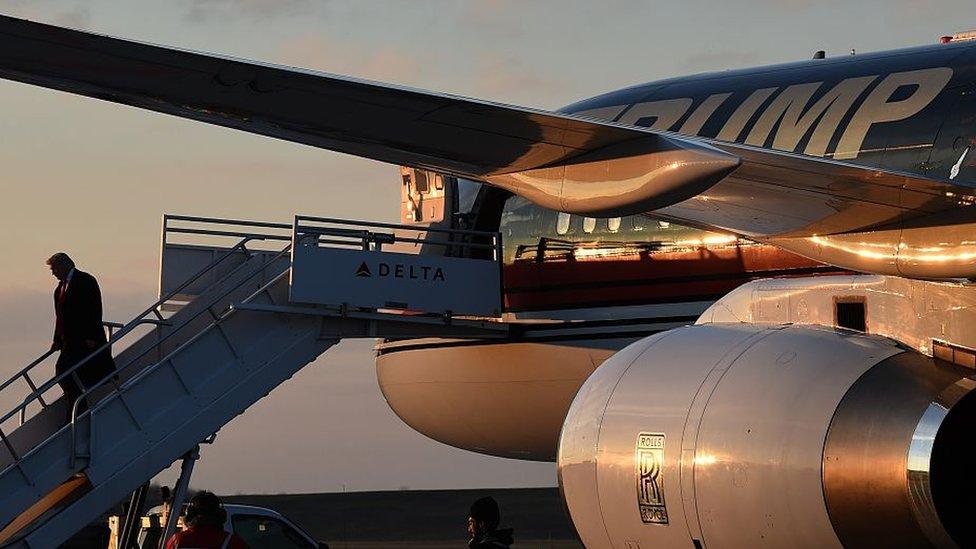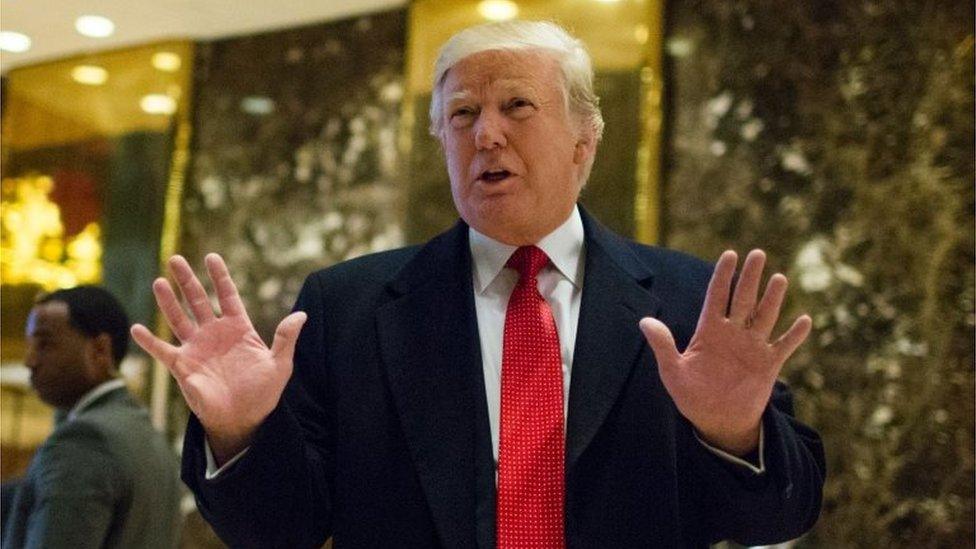Donald Trump presidency: Boeing and his chaos theory
- Published

Mr Trump's own plane is a Boeing 757
Americans voted for Donald Trump (not a majority, but a winning combination) because they wanted change.
They were so fed up with the status quo that they took a gamble on someone who had never held elected office.
It was a metaphorical "let's throw everything in the air and see how it lands - it can't be worse than it is".
Mr Trump is already delivering on his promise to be a disrupter.
In threatening to cancel a multi-billion-dollar contract (caveat - I've grown wary of using Mr Trump's tweeted figures, in this instance $4bn, until they are fact checked), Mr Trump hit at one of the historic symbols of US presidential power.
Swooping in to a foreign country in Air Force One is what American presidents do, except maybe this one won't.
Mr Trump is very happy with his own plane, which after all has his name emblazoned on the side, not that of some generic office.

Boeing's shares slid 1% after Mr Trump's tweet
Boeing's shares slid 1% on the prospect of the deal being cancelled. But it was only 1%, not 5%.
Maybe Mr Trump is right, a new mega-bird is a waste of taxpayers' money and cancelling the order, unthinkable though it seems, isn't such a bad idea.
China has already felt the fallout of Mr Trump's chaos theory of governing.
For 44 years, the US has stuck to a policy of recognising the sovereignty of China but not Taiwan.
But longevity is clearly no protection in an era of disruption.
American voters were no doubt left scratching their heads by the revelation in Mr Trump's tweet that Washington is happy to sell Taiwan millions of dollars worth of weapons (see caveat above) but isn't happy to talk to their president on the phone.
Where do Donald Trump supporters get their news from?
The foreign policy establishment can grumble about potential consequences, but many Americans feel the US has been on the losing end of this relationship for too long.
Why not play tough for a change? Isn't it worth a try?
The biggest indication of Mr Trump's belief that it's time for a shake-up to the existing order is his preference for less government experience over more government experience in the people he is picking for his administration.
In normal circumstances, if you want a job done well, you chose someone with experience doing that job.
But Mr Trump appears to believe that the job of government has been done so badly that that is exactly the wrong approach.
With a couple of exceptions, Mr Trump has chosen people with no experience running a government bureaucracy.
Ben Carson, a neurosurgeon who will now run the housing department, earlier took himself out of the running for a cabinet slot precisely because he didn't have government experience.
Here again, there's a possibility Mr Trump is right.
America is effectively ungovernable at the moment and has been for the past six years.
That's partly the result of divided power, which is a problem Mr Trump won't have.
But it may also be the result of the same people rotating through Washington and getting stuck in the weeds of government.
Which Donald Trump will govern?
Maybe a fresh, outside approach can work. Perhaps people with no experience will be unfettered by protocol, history and existing structures and will be freer to cut through red tape.
None of us know whether this disruption will work or even be noticeably different once Mr Trump's team actually runs up against the realities of government.
But for political scientists, whatever happens over the next four years, it will be an interesting test of the notion that you need experience to run a government.
From Boeing, to Taiwan, to Ben Carson, to Chinese tariffs, Donald Trump is upending America's established order.
Through both the disruptive medium of Twitter and the conventional system of cabinet appointments, he is chucking protocol out the window and signalling that almost everything is up for review.
Even Air Force One.
The question is, will it work?